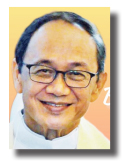
IF we are truly with Christ, there is no doubt that despite our unavoidable differences and conflicts, we can still manage to achieve a certain unity. Christ gives us the way, the power and the grace to achieve this unity.
Thus, the expression, “cor unum et anima una,” (one heart and one soul) as recorded in the Acts of the Apostles. (cfr. 4,32) It characterized the lives of the early Christians who fervently followed the teachings and example of Christ. Let’s hope that we too can manage to achieve that ideal.
To live unity amid plurality and diversity in our lives is a constant quest for us. How do we achieve unity, a desired ideal, amid an obvious plurality we can observe even in each one of us individually, not to mention the ever-widening variety of things among ourselves and between ourselves and the rest of creation?
It’s undeniable that deep within us is a natural longing for unity in whatever level and aspect of our life, whether personal, familial, social, political, or cultural, etc. Without articulating it, we somehow know that unity presumes life and order which we like to enjoy, just as disunity connotes death and disorder which we try to avoid.
The unity we are looking for, of course, is not uniformity and an idle, passive and automatic unity. It’s a dynamic, living unity that has to be worked out, precisely because it is not merely physical unity we are after. It’s a moral unity that involves how we understand and use our freedom, and this can turn in any which way.
Equally undeniable is the plurality that we have to contend with, not only of the different parts we are made of individually, but also of the different views, opinions, tastes and preferences, cultures, lifestyles, etc., that we have to learn to live with among ourselves in the different levels of our collective life.
What we have to do is to seek this unity amid the plurality in our lives is to go to the source and author of unity. In other words, the ever-complicating plurality we have is a call for us to go to God, the Creator of the universe.
He is the one that holds everything in unity, from beginning to end. He is the universal lawgiver, who has designed everything—the spiritual and material, the animate and inanimate beings—into one unified universe, governing everything with his providence.
He knows what to do with whatever situation the world may go as played out by the way we use our freedom. His wisdom cannot be outwitted by the smartest and most cunning of human intelligence and freedom.
We have to understand then that for us to have unity amid the plurality in this world, the unity we have to build should first of all and always be a religious unity, before it is a social, political, cultural or historical unity.
Absent that religious essence of unity, we would be reprising the story of the tower of Babel where a godless pursuit of unity and development produced disunity and confusion instead, leading to the unavoidable consequences of conflicts and wars among the people.
This is what we are witnessing these days, and all throughout our human history. A unity not springing from the unity of God and with God is a false and deceptive unity that often attracts all kinds of danger. We need to ground our pursuit for unity amid plurality on our loving and faithful relationship with God.



